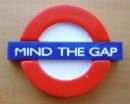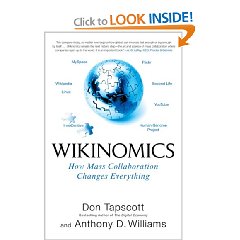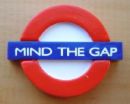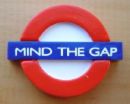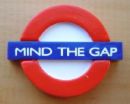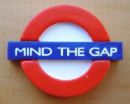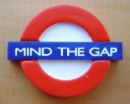Out of respect for Laura K. Turner's deeper knowledge of this author, I am integrating some of her observations and correcting myself where appropriate. The edit below raising the book to a four was done immediately after publishing the original review.
EDIT: After reading Cass Sunstein's book, which earned a four, I feel compelled to raise this to a four but Amazon does not allow me to change star ratings. This is a solid four, the preening not-withstanding.
There are a *lot* of platitudes in this double-spaced book, to the point that I felt I was reading a very simplified version of more complex ideas (which is of course a plus when dealing with ill-informed corporate chiefs and policy-makers (see Ben Gilad, “Blindspots” from Infonortics UK, not available via Amazon).
I've read stuff by this primary author (Tapscott) before and he has certainly made sustained contributions to our understanding, am just wondering if this book was a bit too quickly done–it struck me as more simplistic and shallower than I expected. Although Ms. Turner refers to seven distinct business models, neither “model” nor “business model” appear in the book's index, and my original impression, after a second look at the book and my notes, stands: the subtitle says it all: this is about mass collaboration.
There are a few flaws with this book that would normally take it down to three stars, but given the importance of the topic, the quick read, and the known serious past of the author, I have brought it back up to four after comparing it with “Infotopia.” It is double-spaced with a heavy dose of jargon, with a very over-simplified and uncritical view of the unfettered joys of globalization. This author has evidently never heard of “true cost” or “natural capitalism.”
In light of Ms. Turner's comments, I freely admit to lacking the deeper understanding of past books by the primary author, and I suspect that her spirited defense of this book rests more on substance from the past that a reader of this book cannot fathom.
As one who was first educated in the 1970's, I found it a real irritant to have the author appear to invent and be the catalyst for ideas like prosumer (Alvin Toffler, first used in his keynote speech to my annual conference in 1993), importance of external knowledge (Peter Drucker), and the paradigm shift (Thomas Kuhn in “The Structure of Scientific Revolution”). The author says that he “Don” wrote the book on paradigm shifts. Although the author footnotes the first two, not the third, this is in the end-notes and the sense of preening and exaggeration is distinctly annoying, especially when combined with the almost total lack of recognition of any of the 300 or so books by others about wealth of knowledge, infinite wealth, forbidden knowledge, Voltaire's bastards, etc. This struck me as a very self-centered book in more ways than one.
Now, Ms. Turner says a book should be judged on its rigor, coherence, creativity, and readability. B for the first two, A for the second two.
Although the author mentions GoogleEarth on more than one occasion, there is not real development in this book of the importance of the geospatial foundation for sharing all information in historical and cultural context.
A few minor thoughts worth noting:
–Well-done Wikis (the author makes no mention of trolls or all the other problems associated with Wikipedia) cut email by 75% and meetings by 50%. Would that this were so, and properly documented, but it's a start.
–90% of most R&D is internal and therefore lacking in the diversity that might come from the larger open network. This is *very* important. We need to build the World Brain and machine-speed translation and integration. Singapore, the Nordic nations, and even Estonia are ahead of the USA in this area.
–top billion people are believed by some to have 2-6 spare hours a day during which they could be contributing knowledge and mentoring to the larger group. [Bottom five billion desperately need to be connected to the Net for free, and if we did that–for what we have spent on Iraq we could have given out 5 billion free cell phones–they would create infinite wealthy.]
–Bill Gates thinks that Free/Open Source Software is communist. I guess that's the equivalent of me thinking Microsoft is fascist.
–Four things I had *not* heard of: CollabNet, Scorecard, InnoCentive, and TakingITGlobal.
I am posting two customer images here to try to make the point that the world of mass collaboration is a great deal more complicated and also a great deal more exciting, than the author communicates.
Bottom line: if you are not immersed in this topic, and want one book to partly understand your kids and the emerging, this one will do nicely. It was not deep enough to fully occupy me during a five hour trip from coast to coast–take a second book as back-up.
In addition to acknowledging Ms. Turner's helpful and professionally presented observations, I am using the new feature to add links to other books I recommend. You can see my many lists (especially the one on creating infinite wealth and the other on cheating the 90% that do the real work) for many other recommendations, and if you want to see my reviews easily when books have tens or hundreds of reviews, use the selection box in the upper right of your Amazon profile page. I do not list the author's books because of the limit to 10, but certainly Paradigm Shift and The Digital Economy as well as Digital Capital can be considered.
I conclude that I read broadly and Ms. Turner reads deeply, and I hope this review is a useful intersection of our combined paths.
The Structure of Scientific Revolutions
Introduction to Paradigms: Overview, Definitions, Categories, Basics, Optimizing Paradigms & Paradigm Engines
Out of Control: The New Biology of Machines, Social Systems and the Economic World
Powershift: Knowledge, Wealth, and Power at the Edge of the 21st Century
Smart Mobs: The Next Social Revolution
The Wealth of Networks: How Social Production Transforms Markets and Freedom
Infotopia: How Many Minds Produce Knowledge
Three new references (10 May 2008):
Society's Breakthrough!: Releasing Essential Wisdom and Virtue in All the People
Group Genius: The Creative Power of Collaboration
Collective Intelligence: Creating a Prosperous World at Peace
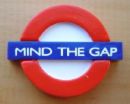 Click Here to Vote on Review at Amazon,
Click Here to Vote on Review at Amazon,


